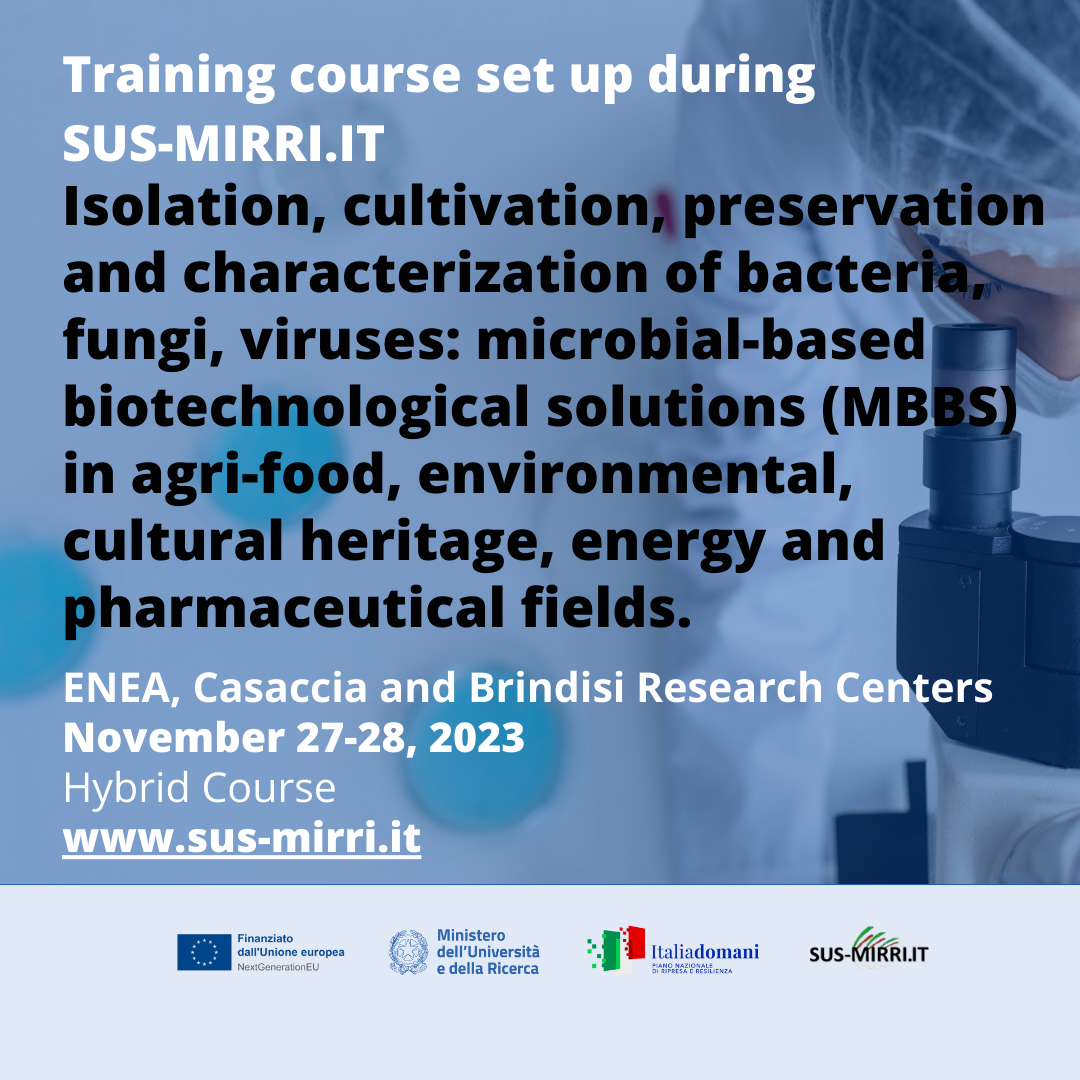Modality: hybrid format
c/o ENEA Centro Ricerche Casaccia (UO10), via Anguillarese 301 S. Maria di Galeria – 00123
ROMA in collaboration with ENEA Centro Ricerche Brindisi (UO09)
Link Monday 27 November: HERE
ID riunione: 396 387 501 980
Passcode: nrgTqR
Link Tuesday 28 November: HERE
ID riunione: 374 864 329 182
Passcode: uc2U2M
Coordinator and lecturers: Prof. Annamaria Bevivino – Head of the ENEA Laboratory for
AgriFood Sustainability, Quality and Safety.
C. Alisi; E. Clagnan; M. Costanzo; D. Cuna; A. Del Fiore; L. Di Gregorio; C. Lico; G. Massini; V.
Mazzurco; V. Miceli; V. Poscente; S. Tabacchioni; F. Tasso; A. Visca.
Practical lessons: C. Alisi; B. Aracri; E. Clagnan; A. Del Fiore; L. Di Gregorio; G. Migliore; P.
Paganin; V. Poscente; F. Sbarra; F. Sevi; S. Tabacchioni; F. Tasso.
COURSE CONTENT
How can microorganisms and the microbiome be utilised for application in the agri-food,
environmental, cultural heritage, energy and pharmaceutical fields? Following the ENEA training course, you will learn about the microorganisms and microbiome, and methods to isolate, detect, characterize and apply microorganisms and microbial consortia in agri-food, environmental, cultural heritage, energy and pharmaceutical fields.
The training course will cover four modules: Module 1: Microorganisms’ isolation, cultivation, and preservation approaches Module 2: Genotypic and phenotypic characterization Module 3: Applications of microorganisms in agri-food, environmental, cultural heritage and pharmaceutical fields Module 4: Cases study related to EU and national projects.
The course is organised in theoretical lessons, practical lectures and laboratory activities. The main aim of the training course is to provide updated concepts and methodologies on the microbial applications in different fields. A number of senior and young ENEA researchers, participating in the SUS-MIRRI.IT project, have kindly agreed to act as trainers for this school.
Day 1: 27/11/2023
Theoretical session – Sala Blu – 9:00-13:00
9:00-9:30 Welcome address and programme overview – A. Bevivino
9:30-10:00 The new age of soil microbiome A. Bevivino
10:00-10:30 Isolation, cultivation and preservation of microorganisms – S. Tabacchioni, A. Del Fiore
10:30-11:00 Biofilms and microscopic observations – L. Di Gregorio, E. Clagnan
11.00 – 11:30 Coffee break
11:30-12:00 DNA analysis, targeted and untargeted methods in metagenomics – M. Costanzo and A. Bevivino
12:00-12:30 Pipelines for NGS data (Illumina/Nanopore) – A. Visca
12:30-13:00 Bioaugmentation strategies to improve the energy valorization of organic waste –G. Massini and V. Mazzurco
Practical lessons – 14:00-17:00
Microbial consortia set-up for sustainable agriculture and biotechnological applications
Assays of plant-growth promoting and biocontrol activity
Microbial biofilms: methods of detection
Day 2: 28/11/2023
Theoretical session – Sala Blu – 9:00-13:00
9:00-9:30 The two-faced plant viruses: from plant pathogen to smart nanoparticles – C. Lico
9:30-10:00 Prebiotics and probiotics for biopackaging: a case study – L. Di Gregorio and M. Costanzo
10:00-10:30 Combination of membrane filtration and fermentation to produce poly-hydroxyalkanoates (PHA): the BIOCOSI’ project – V. Miceli and D. Cuna
10:30-11.00 The flow cytometry and implication in food safety: V. Poscente
11.00 – 11:30 Coffee break
11:30-12:00 Antibiotics and antibiotic resistance genes in anaerobic digesters and agroecosystems – A. Visca
12:00-12:30 Use of microorganisms for the bioremediation of contaminated environments/cultural heritage – F. Tasso and C. Alisi
12:30-13.00 Training course wrap-up, discussion and conclusion – A. Bevivino
Practical lessons – 14:00-17:00
Metabolic fingerprinting: The BIOLOG system
The Flow Citometry: the VBNC state
Microbial application for cultural heritage
Participation
Who can attend? MSc and PhD students or Early Career Investigators. Due to space limitations, the training school is limited to 15 participants belonging to the institutions of the Operating Units (OUs) of the SUS-MIRRI.IT project. If the number of applications for attendance in presence is more than 15 a selection will be made based on:
1. Motivation letter (max 1 page) with an expression of interest and a paragraph describing the relevant scientific activities related to this Training School
2. Curriculum Vitae (max 1 page).
The course will be also taken online for any additional participants.
All the lessons will be held in English.
For in presence course registration: https://forms.gle/Qcc6DjfcneZy8Aq77
For remote course registration: https://forms.gle/i1ETBTHeWaj3mRheA
Information: ombretta.presenti@enea.it; giovanna.marciani@enea.it
DOWNLOAD the program HERE



